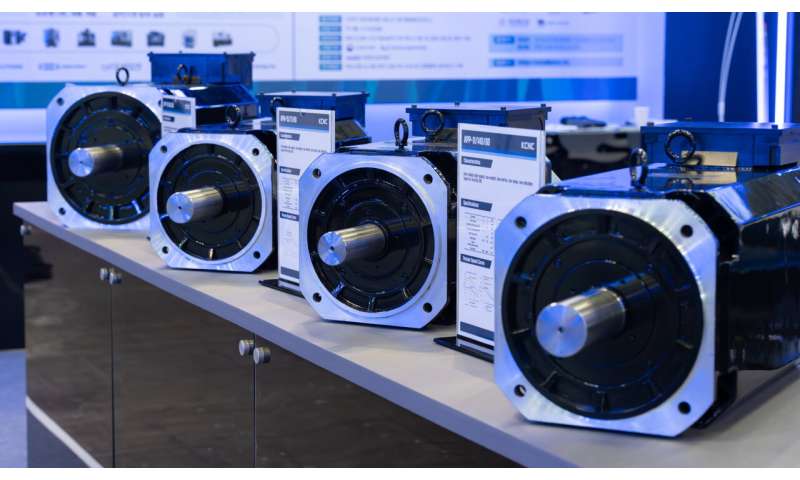This article has been reviewed according to Science X's editorial process and policies. Editors have highlighted the following attributes while ensuring the content's credibility:
fact-checked
trusted source
proofread
South Korea makes advancements in drive system technology for machine tools

Korea Electrotechnology Research Institute (KERI) has succeeded in domestically developing "CNC driving system" technology, a core component of machine tools—often referred to as "Mother Machines," the machines that make other machines.
The CNC (Computer Numerical Control) system is an electronic module that processes numerical information via a computer and automatically controls all functions of machine tools, including position, speed, and rotation of a machine tool. In a computer, it plays a role similar to that of a CPU.
A major challenge for South Korea's machinery industry has been its heavy reliance on imported core components. Notably, over 95% of CNC systems for machine tools have been sourced from Japan and Germany, underscoring the difficulties faced by the domestic technology sector. As the Fourth Industrial Revolution ushers in a greater need for ultra-precision equipment processing, the localization of CNC systems is expected to significantly impact the competitiveness of national strategic technology sectors.
In response, the Ministry of Trade, Industry, and Energy, along with KERI, Korea Institute of Machinery & Materials, Korea Institute of Industrial Technology, 10 universities including Yonsei University and Dankook University, and 8 CNC technology suppliers, have joined forces. Since 2020, they have been working on the 85.5 billion KRW "Smart Controller Technology Development Project for Manufacturing Equipment Systems." The recent positive results from this initiative have garnered significant attention.
Among these, the drive system technology handled by KERI is crucial and challenging, as it performs the "limb" function in CNC systems and accounts for over 70% of the cost, making it a highly significant and complex field. Drive systems must maintain consistent speed and position regardless of the material being machined or the load applied. Additionally, the precision of operations must be within tens of micrometers, requiring measurements using lasers or 3D scanning equipment to detect errors that are not visible to the naked eye.
KERI, which has accumulated over a decade of expertise in precision control research for electromechanical systems, has successfully met the stringent requirements for drive systems and achieved domestic development. It has also been successfully conducting demonstrations at the work sites of leading machine tool companies such as Hyundai WIA and DN Solutions. The technology boasts ultra-precision machining quality that matches or exceeds existing advanced imported products. It has garnered significant industry attention for its reliability and is increasing its potential for commercialization.
-

Ultra-precision machining using CNC machine equipped with KERI's 'CNC Drive System' Credit: Korea Electrotechnology Research Institute (KERI) -

Cutting operation using a machine tool equipped with KERI's 'CNC Drive System' Credit: Korea Electrotechnology Research Institute (KERI) -

Spindle motor, a component of KERI's 'CNC Drive System' Credit: Korea Electrotechnology Research Institute (KERI)
Director Hong-Ju Kim of KERI's Precision Control Research Center stated, "Since traditional manufacturing as well as future industries such as mobility and robotics are largely based on precision machinery, the technological competitiveness of equipment and devices used for processing these machines will determine our future national competitiveness.
"The drive system for machine tools is a crucial component that influences the productivity, precision, and quality of processed products. By domesticating this technology, we aim to reduce technological dependency on foreign products and expect substantial import substitution effects amounting to 300 billion KRW annually."
The research team plans to advance the precision of drive systems to the nanometer level through continuous research and diverse corporate validations. They also aim to introduce upgraded smart drive system technology incorporating artificial intelligence (AI) and automation, and demonstrate industrial robots driven by this technology.















